Cité de Saint-Lizier
times
14H00 / 17H30 Guided tours : 14H30
16H00
Information
GPS coordinates:
Lat.43° 00' 06,3" N Long.01° 08' 14,0" E
Restaurant
Aire de pique-nique






THE BISHOPS’ PALACE AND NOTRE-DAME-DE-LA-SÈDE CATHEDRAL
At the top of the walled town, in the heart of the bishops’ palace, the Ariège département museum invites you on a journey from Antiquity to the present day
It was on this unique site overlooking the Walled Town of Saint-Lizier that the Bishops of Couserans built a sumptuous palace and a richly decorated cathedral that they never ceased to embellish between the 11th and 18th centuries. With the abolition of the bishopric in 1801, the site lost its religious function and by turns served as Town Hall, prison, poorhouse and lunatic asylum.
Today, this imposing building houses the collections of the Ariège Département Museum, presenting 2,000 years of local history.
With the recent rediscovery of the murals in the former Notre-Dame-de-la-Sède cathedral, adjoining the Palace, the unique nature of this ensemble is asserting itself. The successive restoration campaigns have revealed a monumental series of paintings that decorates both the building’s vaults and its walls, and the “Little Sistine Chapel” is now one of Ariège’s not-to-be-missed monuments.
- The Museum
The Ariège Département Museum presents the region’s development over 2,000 year’s history through its varied collections and a modern museum experience suited to all tastes.
The visit covers four major topics, spread through the museum’s four levels:
Room 1: The Roman presence in Couserans
The interest shown by the scholars of Ariège for classical times today offers us a moving collection of objects from everyday life in Roman times, a collection enriched by the chance discovery in 1994 of the Saint-Girons treasure-trove.
Room 2: From the Gallo-Roman town to the Bishops’ Palace of Couserans
At the end of Roman antiquity, the introduction of Christianity and the trauma linked to the great invasions modified society and left lasting traces on the town’s architecture. How was the life of the inhabitants of Saint-Lizier anchored in the Middle Ages?
Room 3: The Bishops’ Palace, history and architecture
From the 11th to the 18th century the bishops expressed their power through ever-more sumptuous architectural projects. The secrets of the Palace and its Cathedral, with its exceptional pictorial wealth, are revealed to you in this room.
Tactile Room: come and “see” some of the Museum’s objects with your hands!
Room 4: Life in a Pyrenean valley at the beginning of the 20th century
Who were the inhabitants of Bethmale Valley? Shepherds, craftsmen, peasants… Discover their lives through numerous authentic objects collected by Jacques Begouën, a Couserans-lover.
Sound Room: Listen to the legends of the Pyrenees!
- Outdoors
A walk through the Palace gardens will take you to the places where the cloister used to stand.
A few metres further along, a belvedere offers you an exceptional view of the Pyrenees. This promontory, built when the building served as a hospital, is located in the heart of the “manics’ courtyard” – in those days it was thought that the view of the scenery would restore a certain degree of serenity to the patients.
This outdoor excursion is accompanied by a chronological monumental frieze that relates the history of Saint-Lizier through the key dates that marked the western world.
- Notre-Dame-de-la-Sède Cathedral
Further to the chance discovery of paintings dating back to the end of the 15th century, Notre-Dame-de-la-Sède Cathedral has recently benefitted from a series of restoration campaigns. A unique ensemble of monumental paintings decorating the building’s vaults and walls were then revealed. Representations of sibyls and patriarchs, a Tree of Jesse, not to mention episodes from the life of Saint James can now be seen.
Based on ochre, charcoal and whitewash, the paintings offer a unity of composition and a harmony of colours from which radiates a joyous and soothing atmosphere.
Often called the “Little Sistine Chapel”, Notre-Dame-de-la-Sède now counts amongst the most beautiful religious buildings in Midi-Pyrénées.
discover










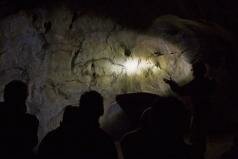
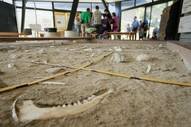


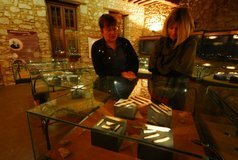
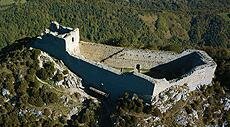



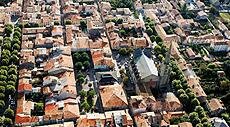

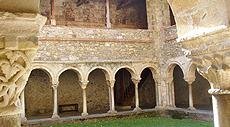

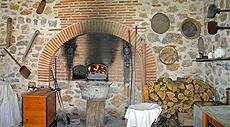













Notre-Dame-de-la-Sède,
“Little Sistine Chapel” is now
one of Ariège’s not-to-be-missed monuments